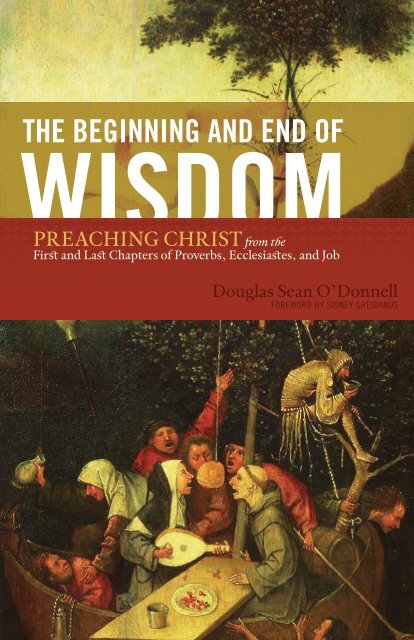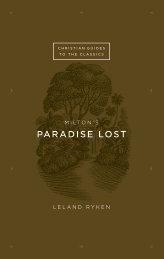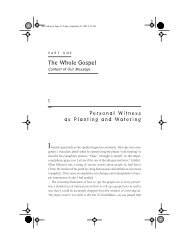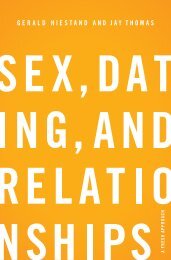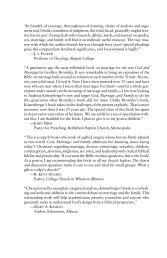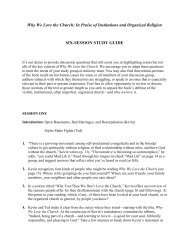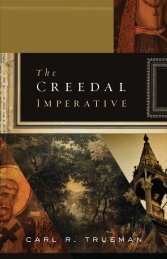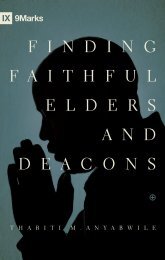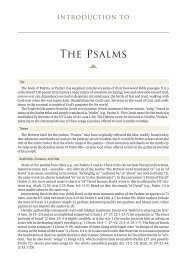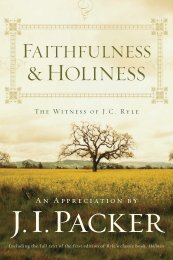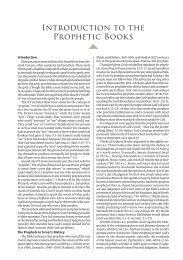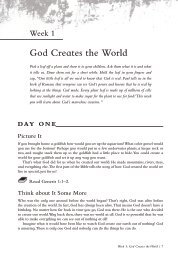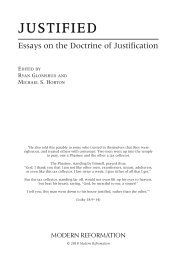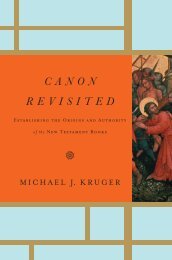The Beginning and End of Wisdom - Monergism Books
The Beginning and End of Wisdom - Monergism Books
The Beginning and End of Wisdom - Monergism Books
- No tags were found...
You also want an ePaper? Increase the reach of your titles
YUMPU automatically turns print PDFs into web optimized ePapers that Google loves.
<strong>The</strong> <strong>Beginning</strong> <strong>and</strong> <strong>End</strong> <strong>of</strong> <strong>Wisdom</strong>: Preaching Christ from the First <strong>and</strong> Last Chapters <strong>of</strong> Proverbs,Ecclesiastes, <strong>and</strong> JobCopyright © 2011 by Douglas Sean O’DonnellPublished by Crossway1300 Crescent StreetWheaton, Illinois 60187All rights reserved. No part <strong>of</strong> this publication may be reproduced, stored in a retrieval system, ortransmitted in any form by any means, electronic, mechanical, photocopy, recording, or otherwise,without the prior permission <strong>of</strong> the publisher, except as provided for by USA copyright law.Cover design: Spire2 CommunicationsInterior design <strong>and</strong> typesetting: Lakeside Design PlusFirst printing 2011Printed in the United States <strong>of</strong> AmericaUnless otherwise indicated, Scripture quotations are from the ESV ® Bible (<strong>The</strong> Holy Bible, EnglishSt<strong>and</strong>ard Version ® ), copyright © 2001 by Crossway. Used by permission. All rights reserved.Scripture quotations marked kjv are from the King James Version <strong>of</strong> the Bible.Scripture quotations marked message are from <strong>The</strong> Message. Copyright © by Eugene H. Peterson1993, 1994, 1995, 1996, 2000, 2001, 2002. Used by permission <strong>of</strong> NavPress Publishing Group.Scripture references marked niv are taken from the Holy Bible, New International Version ® .Copyright © 1973, 1978, 1984 Biblica. Used by permission <strong>of</strong> Zondervan. All rights reserved. <strong>The</strong>“NIV” <strong>and</strong> “New International Version” trademarks are registered in the United States Patent <strong>and</strong>Trademark Office by Biblica. Use <strong>of</strong> either trademark requires the permission <strong>of</strong> Biblica.All emphases in Scripture quotations have been added by the author.Trade paperback ISBN: 978-1-4335-2334-2PDF ISBN: 978-1-4335-2335-9Mobipocket ISBN: 978-1-4335-2336-6ePub ISBN: 978-1-4335-2337-3Library <strong>of</strong> Congress Cataloging-in-Publication DataO’Donnell, Douglas Sean, 1972–<strong>The</strong> beginning <strong>and</strong> end <strong>of</strong> wisdom : preaching Christ from the first <strong>and</strong> last chapters <strong>of</strong>Proverbs, Ecclesiastes, <strong>and</strong> Job / Douglas Sean O’Donnell ; foreword by Sidney Greidanus.p. cm.Includes bibliographical references (p. ) <strong>and</strong> index.ISBN 978-1-4335-2334-2 (tp)1. Bible. O.T. Proverbs—Sermons. 2. Bible. O.T. Ecclesiastes—Sermons. 3. Bible. O.T. Job—Sermons. 4. Sermons, American—21st century. 5. Presbyterian Church—Sermons. I. Title.BS1465.54.O36 2011223'.06—dc22Crossway is a publishing ministry <strong>of</strong> Good News Publishers.VP 22 21 20 19 18 17 16 15 14 13 12 1114 13 12 11 10 9 8 7 6 5 4 3 2 12011005644
ContentsList <strong>of</strong> Tables 11Foreword by Sidney Greidanus 13Acknowledgments 17Preface: <strong>The</strong> <strong>Beginning</strong> <strong>of</strong> <strong>Wisdom</strong> for Beginners 19Introduction: Why Christians Are Fools 25Chapter 1 Ship <strong>of</strong> Fools (Proverbs 1:1–7) 33Chapter 2 Imperishable Beauty (Proverbs 31:10–31) 47Chapter 3 Why Work? (Ecclesiastes 1:1–11) 61Chapter 4 Repining Restlessness (Ecclesiastes 12:13–14) 77Chapter 5 <strong>The</strong> Devil’s Question (Job 1:1–12) 91Chapter 6 My Servant (Job 42:1–17) 105Chapter 7 How Shall <strong>Wisdom</strong> Be Preached? 119Appendix A: Preaching Hebrew Poetry 139Appendix B: Book Summaries <strong>and</strong> Suggested Sermon Series 153Bibliography 161Notes 177General Index 223Scripture Index 229
IntroductionWhy Christians Are FoolsIf I knew it would require dropping out <strong>of</strong> school, I probably wouldhave said no. While in graduate school (but not for graduateschool), I vowed to read the entire Works <strong>of</strong> Jonathan Edwardsin a year. 1 Yes, the entire works! Stamped on the inside cover <strong>of</strong> thefirst volume was this inscription:<strong>The</strong>se volumes are the gift <strong>of</strong> John H. Gerstner to Douglas O’Donnellwho has vowed to God that he will complete their reading withinone year <strong>of</strong> receiving them. Soli Deo Gloria!That was the deal: Dr. Gerstner gave me the books for free; I vowedto read them.When the books came in the mail, I opened them with eagerexcitement. Free books! Free Edwards! Freedom <strong>of</strong> the Will! I wasconverted to Christ when I was nineteen <strong>and</strong> converted to readingshortly thereafter. My job helped form <strong>and</strong> feed this new obsession.I worked as an overnight security guard at ServiceMaster’s corporateheadquarters. Every three hours I did my rounds. This tookabout ten minutes each time. <strong>The</strong> rest <strong>of</strong> the time—other than eatingleftover shrimp in the kitchen from some fancy corporate party,25
Introductionplaying intercom games with the other security guards, strummingmy guitar, <strong>and</strong> doing homework—I read. For four straight years forat least four hours a night, I read dead theologians. I read Augustine.I read Luther. I read Aquinas. I read Calvin. I read Chrysostom. Iread Wesley. I read Boethius, for goodness sake. And, yes, I readAmerica’s most renowned theologian.My fellow security guard, the son <strong>of</strong> an Iowa farmer, called me a“plower.” He likened my reading habits to his father’s work. “Youplow through books slowly but surely, like a plow overturning thesoil,” he would say with some affection <strong>and</strong> subtle admiration. “Nextthing I know, you’re done with this huge book.”Plower or not, half a year into reading Edwards the plow gotstuck. I realized that at the pace I was going—the only pace I couldgo with such complex <strong>and</strong> interesting material—my vow would beimpossible to keep. Something had to give: the rounds? <strong>The</strong> shrimp?<strong>The</strong> intercom? <strong>The</strong> guitar? School?School! I became a grad school dropout in order to remain a fulltimesecurity guard/Edwardsian reader. With a thin yellow highlighterwedged atop my left ear <strong>and</strong> a red pencil in my right h<strong>and</strong>, I read,marked, <strong>and</strong> learned. I underlined <strong>and</strong> asterisked every importantsentence, <strong>and</strong> then, in the back <strong>of</strong> each volume, I scribbled myfavorite quotes. I finished on December 20, 1994, which I knowbecause I joyfully inscribed it on the front plate beneath Gerstner’sSoli Deo Gloria.Just the other day I pulled these volumes <strong>of</strong>f my shelf, <strong>and</strong> I relivedthat year for a moment. Like rereading the Bible that I first readcover to cover <strong>and</strong> marked up with obnoxious colors <strong>and</strong> mutilatingmarkings, these volumes revealed so much <strong>of</strong> my early Christian life.In those back pages, I saw how much I valued Edwards’s majesticview <strong>of</strong> God, salvation, <strong>and</strong> the church:God is the highest Good <strong>of</strong> the reasonable creature; <strong>and</strong> the enjoyment<strong>of</strong> Him is the only happiness with which our souls can besatisfied.26
Introduction<strong>The</strong> church is the completeness <strong>of</strong> Christ, the fullness <strong>of</strong> Him thatfilleth all in all.Surely, the more the sinner has an inward, an immediate, <strong>and</strong> sole,<strong>and</strong> explicit dependence upon Christ, the more Christ has the glory<strong>of</strong> his salvation from him.<strong>The</strong> man Jesus Christ, who is the head <strong>of</strong> all creatures, is the mosthumble <strong>of</strong> all creatures.I am bold to say that the work <strong>of</strong> God in the conversion <strong>of</strong> one soul. . . is a more glorious work <strong>of</strong> God than the creation <strong>of</strong> the wholematerial world.To take on yourself to work out redemption is a greater thing thanif you had taken it upon you to create a world.<strong>The</strong> gospel <strong>of</strong> the blessed God does not go abroad begging for itsevidence, so much as some think: it has its highest <strong>and</strong> most properevidence in itself.<strong>The</strong>re is not so much difference before God, between children <strong>and</strong>grown persons, as we are ready to imagine; we are all poor, ignorant,foolish babes in His sight. Our adult age does not bring us so muchnear to God as we are apt to think.That final quote I liked best. (It has five stars next to it.) And today Istill like it in its depiction <strong>of</strong> how we relate to, explain, <strong>and</strong> apply the<strong>Wisdom</strong> Literature <strong>of</strong> the Bible. In all my study <strong>of</strong> the Christian faithover these last twenty years, <strong>and</strong> especially in my recent work on Proverbs,Ecclesiastes, <strong>and</strong> Job, I find Edwards’s thought here instructive.I have gained enormous insight about God, his Word, <strong>and</strong> his world,<strong>and</strong> yet I know that I know so little. I have plumbed the depths <strong>of</strong> theriches <strong>of</strong> the wisdom <strong>and</strong> knowledge <strong>of</strong> God only to learn that I amstill but a poor, ignorant, foolish babe in his sight. I have climbed the27
Introductionmountains <strong>of</strong> his unsearchable judgments <strong>and</strong> inscrutable ways onlyto find myself not as near to God as I am apt to think.Where Shall <strong>Wisdom</strong> Be Found?<strong>The</strong> <strong>Wisdom</strong> Literature is helpful in humbling us before God. Itis more helpful, I dare say, than any other part <strong>of</strong> the Bible. <strong>The</strong>sethree books put us in our place. We can dig deep into the recesses<strong>of</strong> human knowledge. We can mine diamonds from the caverns <strong>of</strong>human existence, experience, <strong>and</strong> observation. But we cannot findwisdom, that wisdom which is heavenly—“from above”—from theone who “is above all” (John 3:31). We have “earthly wisdom”(2 Cor. 1:12). But the Lord alone has heavenly wisdom. He aloneis wise (Job 28:23–27; 37:1–42:6).God’s wisdom wearies us if we try to grasp it through humanlymeans (Prov. 30:1b). Knowledge <strong>of</strong> the Holy One cannot be foundwithin (vv. 2–3). Knowledge <strong>of</strong> the Holy One cannot be obtainedby climbing Jacob’s ladder to peek our heads through the clouds(v. 4a). We cannot wrap our minds around the one who “wrappedup the waters in a garment” (v. 4c), who “gathered the wind in hisfists” (v. 4b). We can only see flickers <strong>of</strong> light in the night sky. Streaks<strong>of</strong> lightning that dance in the storm. And such light—momentarylight—comes only through open eyes <strong>and</strong> h<strong>and</strong>s <strong>and</strong> hearts, <strong>and</strong>with faces to the ground.“Where shall wisdom be found?” (Job 28:12b; cf. v. 20). That isthe foundational question <strong>of</strong> the <strong>Wisdom</strong> Literature. And <strong>Wisdom</strong>Literature answers: “<strong>The</strong> fear <strong>of</strong> the Lord, that is wisdom” (Job28:28). This wisdom from above comes only “to those who takerefuge in him” (Prov. 30:5b). 2 This wisdom only comes to thosewho echo John the Baptist’s words about God incarnate: “He mustincrease, but I must decrease” (John 3:30).So the <strong>Wisdom</strong> Literature teaches us that the door to the kingdomis open to those whose childlike faith underst<strong>and</strong>s how the wisdom<strong>of</strong> God comes only from the fear <strong>of</strong> God. But it also teaches us28
IntroductionChristocentric <strong>Wisdom</strong>In his commentary on Isaiah, the church father Jerome wrote, “Tobe ignorant <strong>of</strong> the Scripture is to be ignorant <strong>of</strong> Christ.” 4 Jeromewas right. If we know nothing <strong>of</strong> the Word <strong>of</strong> God, we will knownothing <strong>of</strong> the Son <strong>of</strong> God. Put positively, the more we know theBible, the better we will know the person <strong>and</strong> work <strong>of</strong> Jesus Christ.Jerome’s saying, however, can be reversed to make just as pointeda point: “To be ignorant <strong>of</strong> Christ is to be ignorant <strong>of</strong> Scripture.” Forisn’t this the claim <strong>of</strong> Jesus himself? In John 5:39–40 Jesus rebukedthe Pharisees with these words: “You search the Scriptures becauseyou think that in them you have eternal life; <strong>and</strong> it is they that bearwitness about me, yet you refuse to come to me that you may havelife.” Life does not come through Bible literacy. Life comes throughJesus. And a right underst<strong>and</strong>ing <strong>of</strong> Scripture comes through knowledge<strong>of</strong> Jesus <strong>and</strong> trust in him. As Paul wrote:For to this day, when [unconverted Jews] read the old [testament],that same veil remains unlifted, because only through Christ is ittaken away. Yes, to this day whenever Moses is read a veil lies overtheir hearts. But when one turns to the Lord, the veil is removed.(2 Cor. 3:14b–16)Such knowledge underst<strong>and</strong>s that just as every book <strong>of</strong> the OldTestament adds light to our underst<strong>and</strong>ing <strong>of</strong> Jesus, so the revelation<strong>of</strong> God in the person <strong>of</strong> Christ enlightens our underst<strong>and</strong>ing<strong>of</strong> the Old Testament. Martin Luther put it this way: “We can onlyread the Bible forwards, but we have to underst<strong>and</strong> it backwards.” 5Jesus spoke <strong>of</strong> this forwards-backwards reading <strong>of</strong> the Word in Luke24:44, where he taught his disciples how every book <strong>of</strong> the OldTestament canon—the “Law <strong>of</strong> Moses <strong>and</strong> the Prophets <strong>and</strong> thePsalms”—attested to his person <strong>and</strong> work, notably his death <strong>and</strong>resurrection. Most significant for our study is when he mentioned“the Psalms,” referencing the ketuvim or “Writings,” which consists<strong>of</strong> eleven books, the first being the book <strong>of</strong> Psalms <strong>and</strong> the last30
IntroductionChronicles (1 <strong>and</strong> 2 Chronicles). Also included in “the Psalms” arethe books <strong>of</strong> Proverbs, Ecclesiastes, <strong>and</strong> Job. 6So, are the books <strong>of</strong> Proverbs, Ecclesiastes, <strong>and</strong> Job about Jesus?Jesus says so. And this book aims to show how so. In the preface, Istated my tw<strong>of</strong>old aim: (1) to help you know <strong>and</strong> enjoy the <strong>Wisdom</strong>Literature so that you might preach on it more <strong>of</strong>ten; <strong>and</strong> (2) to showyou how to preach Christ from this genre. I hope by reading <strong>and</strong>applying this book your mind will be “opened . . . to underst<strong>and</strong>”(Luke 24:45) perhaps something, if not “everything [!] written about[Christ]” (v. 44) in the <strong>Wisdom</strong> Literature.May it be so to God’s glory <strong>and</strong> the good <strong>of</strong> the church.31
1Ship <strong>of</strong> FoolsProverbs 1:1–7<strong>The</strong> fear <strong>of</strong> the Lord is the beginning <strong>of</strong> knowledge; fools despisewisdom <strong>and</strong> instruction.—Proverbs 1:7Thank God I didn’t vow to God. Last year I began a decade-longprocess <strong>of</strong> reading the Pulitzer Prize–winning novels from thelast century. Yet, after drudging through four more recent winners<strong>and</strong> finding drab protagonists <strong>and</strong> meatless plots, I ab<strong>and</strong>onedmy aren’t-I-eccentric? ambition for a less l<strong>of</strong>ty but more rewardingone: <strong>The</strong> Adventures <strong>of</strong> Robin Hood, <strong>The</strong> Jungle Book, RobinsonCrusoe, Kidnapped, Sleeping Beauty, <strong>and</strong> Aladdin <strong>and</strong> Other Talesfrom the Arabian Nights. <strong>The</strong>se six children’s classics—beautifullybound, sitting patiently, un-eccentrically atop the black desk in myfamily room—beckoned me. Take <strong>and</strong> read. Take <strong>and</strong> read.I took <strong>and</strong> read—six classics in one year.And what fun it was. Three cheers for plots <strong>and</strong> protagonists.Hurray for stealing from the rich. Hurray for shipwrecks. Hurray33
<strong>The</strong> <strong>Beginning</strong> <strong>and</strong> <strong>End</strong> <strong>of</strong> <strong>Wisdom</strong>for talking animals. And hip, hip, hurray Aladdin, my favorite <strong>of</strong>the six. Hurray for medieval Arabian (Islamic) folktales!<strong>The</strong> Disney version leaves out anything <strong>and</strong> everything Islamic(too bad). Yet, like the book, the movie covers Aladdin’s discovery<strong>of</strong> the magic lamp, the emergence <strong>of</strong> an all-powerful genie, <strong>and</strong> thatgenie’s willingness to fulfill his master’s every wish. How exciting!With the ability to request anything, Aladdin asks for what mostsensible single men would ask: to marry the most beautiful womanin the kingdom, the sultan’s daughter. Yet he takes a roundaboutway. I would have comm<strong>and</strong>ed that genie, “Give me the princessnow!” <strong>and</strong> let the genie work out the details. But Aladdin asks forriches to impress the princess’s father. He gets the riches, whichopens the door to the sultan’s approval. Our hero gets the girl. Now,there’s more to the story (much more), but that’s the first <strong>and</strong> mostimportant half <strong>of</strong> it.I begin with that folktale because an Aladdin-like moment occursin King Solomon’s life. In 1 Kings 3:5 we read not <strong>of</strong> some magicgenie but <strong>of</strong> the Lord God Almighty coming to David’s son, theauthor <strong>of</strong> the book <strong>of</strong> Proverbs. 1 In a dream, God speaks to him:“Ask for whatever you want me to give you” (niv). Now, that’s not“Your wish is my comm<strong>and</strong>,” but it’s fairly close.And how did Solomon reply? Did he say, “Show me the money”?No. How about, “Give me the girl”? No. Solomon wanted wisdom.After praising the Lord for the Lord’s steadfast love, he asked for theability to discern right from wrong—for wisdom. He wanted wisdomso that he might govern his life <strong>and</strong> his kingdom in a fitting manner.This so pleased the Lord—that Solomon didn’t ask for long life,riches, or military victory (or for Pharaoh’s daughter or any other“sultan’s” daughter)—that God bestowed upon him “a wise <strong>and</strong>discerning mind” (v. 12b) <strong>and</strong> gave to him “wisdom <strong>and</strong> underst<strong>and</strong>ingbeyond measure . . . so that Solomon’s wisdom surpassedthe wisdom <strong>of</strong> all” (4:29–30a). 234
Ship <strong>of</strong> FoolsWe All Need <strong>Wisdom</strong>When I was a newborn Christian (for me—age nineteen), I rememberthe first time I came across James 1:5: “If any <strong>of</strong> you lacks wisdom,let him ask God, who gives generously to all without reproach, <strong>and</strong>it will be given him.” At the time, I considered wisdom to be theicing on the cake <strong>of</strong> Christian discipleship. I reasoned, “Oh, thingsare going pretty well in my Christian life, but now <strong>and</strong> then I needa bit <strong>of</strong> wisdom to make an important decision—what girl I shouldmarry; what college I should attend—<strong>and</strong> so that’s when I’ll ask forit.” That’s when I rub the lamp, if you will. Yet now I realize, asSolomon did much earlier, that I need wisdom like I need oxygen<strong>and</strong> water—<strong>and</strong> love.Isn’t this true for you? We all need wisdom. And not just wisdomin the massive decisions <strong>of</strong> life but in our everyday relationships withtheir moment-by-moment choices—at home, in the workplace, inour neighborhoods. Thankfully, our gracious God has not left us toour own devices. He has given us the <strong>Wisdom</strong> Literature <strong>of</strong> the Bible,especially the book <strong>of</strong> Proverbs, where its short <strong>and</strong> salty Solomonicsayings teach us God’s mind on many matters under the sun.How do I find a good wife? It’s in there. How do I raise godlychildren? It’s in there. Why should I deal honestly in business? It’sin there. What I am to do with this tongue, which sometimes likesto fib, gossip, <strong>and</strong> yell? It’s in there. Why is it important to roll out<strong>of</strong> bed each morning <strong>and</strong> work hard? It’s in there. How do I becomea wise <strong>and</strong> respected leader within my community? It’s in there.Here at the very start <strong>of</strong> Proverbs (1:2–6), Solomon calls everyonewho needs everyday wisdom—the young, the simple, <strong>and</strong> thosealready wise—to listen up. Do you need practical wisdom: “instructionin wise dealing” <strong>and</strong> “prudence . . . knowledge <strong>and</strong> discretion”(vv. 3–4)? Well, then, listen up. Do you need intellectual wisdom:insight into insightful words (vv. 2b, 4b)? Well, then, listen up. Doyou need moral wisdom: “instruction . . . in righteousness, justice,<strong>and</strong> equity” (v. 3b)? Well, then, listen up. And do you need mysteriouswisdom: “guidance” <strong>and</strong> the ability to underst<strong>and</strong> or comprehend35
Ship <strong>of</strong> Foolsfool, people might not know the difference.” Proverbs has some <strong>of</strong>the characteristics <strong>of</strong> these other famous compilations <strong>of</strong> practicalwisdom, but what sets it apart is its teaching that knowledge beginswith an appropriate disposition toward God. This is not to say thatProverbs contains no practical truisms, but rather that it sets thesetruisms upon the foundation <strong>of</strong> a relationship with a specific God,“the Lord” (Yahweh), the true <strong>and</strong> living God who has covenantedwith Israel. Proverbs claims that the acquisition <strong>of</strong> true wisdomcomes from a right relationship with Yahweh <strong>and</strong> an appropriateattitude toward him: fear.<strong>The</strong> <strong>Beginning</strong> <strong>of</strong> <strong>Wisdom</strong>Okay. Fine. That’s the “beginning.” But what then does it mean t<strong>of</strong>ear the Lord? Well, let me give you my definition, which I derivedfrom studying all the references to “fear <strong>of</strong> the Lord” exclusivelyin Proverbs. I will give my definition, briefly explain it, <strong>and</strong> thenthoroughly illustrate it. Here’s the definition:According to the book <strong>of</strong> Proverbs, “the fear <strong>of</strong> the Lord” is a continual(23:17), humble, <strong>and</strong> faithful submission to Yahweh, whichcompels one to hate evil (8:13) <strong>and</strong> turn away from it (16:6) <strong>and</strong> bringswith it rewards better than all earthly treasures (15:16)—the rewards<strong>of</strong> a love for <strong>and</strong> a knowledge <strong>of</strong> God (1:29; 2:5; 9:10; 15:33), <strong>and</strong>long life (10:27; 14:27a; 19:23a), confidence (14:26), satisfaction,<strong>and</strong> protection (19:23).So the fear <strong>of</strong> the Lord isn’t as fearful a concept as it sounds.(Although, don’t take all the fright out <strong>of</strong> fear.) It is simply a way(both an Old <strong>and</strong> New Testament way; see Acts 9:31) <strong>of</strong> talkingabout one’s attitude toward God, an attitude <strong>of</strong> submission, respect,dependence, <strong>and</strong> worship. 8<strong>The</strong> Fear <strong>of</strong> the Lord—Illustrating the IdeaAs I thought about illustrating this idea, human-angelic encounterscame to mind. In the Bible, what <strong>of</strong>ten happened when an angel37
<strong>The</strong> <strong>Beginning</strong> <strong>and</strong> <strong>End</strong> <strong>of</strong> <strong>Wisdom</strong>appeared to a human being? What was Mary’s response to the angelGabriel (Luke 1:29–30)? Fear. And how did the guards who saw theangel that rolled back the stone <strong>of</strong> the tomb react? Fear. Matthewtells us that they “trembled <strong>and</strong> became like dead men” (Matt. 28:4).Do you remember what Samson’s father said after the angel <strong>of</strong> theLord visited him? He said, in great trepidation, “We shall surely die”(Judg. 13:22). Angelic encounters are fearful, <strong>and</strong> that is why it’snot uncommon that the first words an angel says are, “Fear not.”As I thought about those angelic encounters, I thought they mightbe the perfect illustration <strong>of</strong> what it means to fear God. <strong>The</strong> pointbeing: if we fear even angels, mere creatures, how much more oughtwe to fear God? 9 But since such encounters involved fear mostlyin the sense <strong>of</strong> fearing for one’s life—i.e., “I’m scared”—I decidedagainst that. It gets part <strong>of</strong> the idea, but not all <strong>of</strong> it. It touches onthe holiness aspect, which dem<strong>and</strong>s our respect <strong>and</strong> awe, but toucheslittle on faith, which is also necessary for “fearing” the Lord.So, next, I thought about using one <strong>of</strong> the many examples <strong>of</strong>encounters with God from the Old Testament narratives. I thoughtabout Moses at the burning bush (Exodus 3). I thought about Isaiah’svision <strong>of</strong> the thrice-holy God in whose presence the purest <strong>of</strong> angelsveil their eyes (Isaiah 6). I thought about Daniel’s vision, where hedescribes himself as having “no strength” left in him <strong>and</strong> falling withhis face to the ground (Dan. 10:8–9). I thought about righteous Job’srepentance after he “sees” God in his holiness <strong>and</strong> sovereignty overcreation (Job 38–41), where he says, “I despise myself, <strong>and</strong> repentin dust <strong>and</strong> ashes” (42:6).<strong>The</strong>se divine theophanies—better than the angelic encounters—illustrate the balance <strong>of</strong> fear (fright <strong>of</strong> God) <strong>and</strong> faith (trust in <strong>and</strong>obedience to God). So they work well to illustrate the idea. Yet Ihave found that the best, fullest, <strong>and</strong> clearest pictures <strong>of</strong> “the fear<strong>of</strong> God” occur in the incarnation, when people encountered God inthe flesh, the Lord Jesus Christ. So, it is to the Gospels we turn next.Although Jesus’s humanity <strong>of</strong>ten veiled his divinity, we neverthelesshave scenes in the Gospels where the brilliant light—the38
<strong>The</strong> <strong>Beginning</strong> <strong>and</strong> <strong>End</strong> <strong>of</strong> <strong>Wisdom</strong>is my beloved Son, with whom I am well pleased; listen to him”(Matt. 17:5). How did Peter, James, <strong>and</strong> John respond? “When thedisciples heard this, they fell on their faces <strong>and</strong> were terrified” (v. 6).While each <strong>of</strong> these Gospel narratives illustrates only part <strong>of</strong> whatis meant by “fear <strong>of</strong> the Lord,” each frame seen together fills in thepicture. Seen together we see fear <strong>and</strong> faith. 10 Seen together we seeJesus’s greatness, power, <strong>and</strong> holiness, along with our recognition<strong>of</strong> lack <strong>of</strong> greatness, power, <strong>and</strong> holiness. Seen together we see theattitude <strong>of</strong> submission <strong>and</strong> respect <strong>and</strong> dependence <strong>and</strong> worship.Seen together we see “the fear <strong>of</strong> the Lord.”No Fear <strong>of</strong> God before <strong>The</strong>ir EyesAnd seen together, we see why today such a sight is unseen. As itwas in Paul’s day, so it is in ours: “<strong>The</strong>re is no fear <strong>of</strong> God beforetheir eyes” (Rom. 3:18). 11 For most people today there is no fear <strong>of</strong>God because, as I see it, they don’t underst<strong>and</strong> who they are dealingwith. Jesus has been raised from the dead. Jesus has ascended intoheaven. Jesus now sits exalted at the right h<strong>and</strong> <strong>of</strong> God the Father.This is the Jesus to whom heaven’s highest creatures fall down <strong>and</strong>worship (Revelation 4–5). <strong>The</strong>re is no fear <strong>of</strong> God in people’s eyestoday because they have the wrong Jesus before their eyes! <strong>The</strong>ydon’t underst<strong>and</strong> who he is, what he has done, <strong>and</strong> what he willdo. <strong>The</strong>y treat him like a pauper when he is the prince, the heir <strong>of</strong>David’s eternal kingdom, the very God to whom they ought to bowdown <strong>and</strong> adore.In this way they are like that one thief on the cross next to Jesuswho joins the crowd in taunting <strong>and</strong> teasing our Lord: “If you arethe Christ <strong>of</strong> God, the king, his chosen one, then save me <strong>and</strong> saveus <strong>and</strong> save yourself.” People are just like that today. <strong>The</strong>y don’tunderst<strong>and</strong> who Jesus is. <strong>The</strong>y don’t underst<strong>and</strong> the purpose <strong>and</strong>the power <strong>of</strong> the cross. And that is why they won’t heed the words<strong>of</strong> the other thief, who recognized his sin <strong>and</strong> his need for Jesus assavior <strong>and</strong> therefore turned to his thieving buddy <strong>and</strong> said, “Don’tyou fear God, <strong>and</strong> don’t you underst<strong>and</strong> we deserve to die?” And40
Ship <strong>of</strong> Foolsit is why they won’t follow this thief’s example <strong>of</strong> faith: “Jesus,remember me when you come into your kingdom.” 12This thief understood his need for Jesus as did former slave traderturned hymn writer John Newton, who wrote:Amazing grace! How sweet the soundThat saved a wretch like me!I once was lost, but now am found;Was blind, but now I see.’Twas grace that taught my heart to fear . . .Is that what you need today? Are you ready to begin the way <strong>of</strong>wisdom? Do you need this amazing grace, a grace which teaches ourhearts to fear, to fall before the Lord, even our Lord Jesus Christ,<strong>and</strong> cry out, “I’m a wretch, I’m blind, I’m lost; cure me, find me,open these eyes”?<strong>The</strong> <strong>End</strong> <strong>of</strong> Fools“<strong>The</strong> fear <strong>of</strong> the Lord is the beginning <strong>of</strong> knowledge.” But that’s notthe end <strong>of</strong> it. Proverbs 1:7, which has been the focus <strong>of</strong> this chapter,has another lesson to teach us, for it continues, “Fools despisewisdom <strong>and</strong> instruction.” What does it mean to fear the Lord?We’ve spent most <strong>of</strong> our time thus far answering that question. Butthere are two other important questions raised by the second half<strong>of</strong> this verse: first, who doesn’t fear the Lord? Answer: fools! “Foolsdespise wisdom <strong>and</strong> instruction.” 13 Second, what does it matter?Fools despise wisdom. So what? <strong>The</strong> fear <strong>of</strong> the Lord is the beginning<strong>of</strong> knowledge, but what is the end <strong>of</strong> fools? What becomes <strong>of</strong> thosewho reject God’s wisdom? Well, that’s what much <strong>of</strong> Proverbs <strong>and</strong>some <strong>of</strong> the rest <strong>of</strong> Scripture is all about. And that’s what I want toexplore with you now briefly.Seven Deadly SinsI imagine you’re familiar with the phrase “ship <strong>of</strong> fools.” It was acommon medieval motif used in literature <strong>and</strong> art, especially religious41
<strong>The</strong> <strong>Beginning</strong> <strong>and</strong> <strong>End</strong> <strong>of</strong> <strong>Wisdom</strong>satire. 14 One such satire is Hieronymus Bosch’s famous oil painting bythat name (c. 1490–1500), which now hangs in the Louvre in Paris.In this marvelous work, which is filled with wonderful symbolism,it shows ten people aboard a small vessel <strong>and</strong> two overboard swimmingaround it. It is a ship without a pilot (captain), <strong>and</strong> everyoneonboard <strong>and</strong> overboard is too busy drinking, feasting, flirting, <strong>and</strong>singing to know where on earth the waves are pushing them. <strong>The</strong>yare fools because they are enjoying all the sensual pleasures <strong>of</strong> thisworld without knowing where it all leads. Atop the mast hangs abunch <strong>of</strong> dangling carrots, <strong>and</strong> a man is climbing up to reach them.Yet above those carrots we find a small but significant detail: a humanskull. This is the thirteenth head in the painting, unlucky in everyimaginable way. <strong>The</strong> idea is that these twelve fools, who think allis perfect, are sailing right to their demise. <strong>The</strong> only pilot on board,the only figure leading the way, is death.In its own artistic way, the book <strong>of</strong> Proverbs takes us onboardthis ship <strong>and</strong> shows us what happens when the sins common butfatal to us are the wind beneath our sails. 15 It shows us the destination—whatnormally happens in this world—<strong>of</strong> those who rejectwisdom.<strong>The</strong>re are a number <strong>of</strong> points to the Christian worldview that arehard for a non-Christian to comprehend, but this one, I believe, isn’tone <strong>of</strong> them. Christian <strong>and</strong> non-Christian alike know what usuallyhappens to the man who loves himself too much (pride) or eats toomuch (gluttony) or works too little (sloth) or can’t keep his head(anger). Does this world, even this fallen world, rise up <strong>and</strong> call him“blessed”? No. Even this world, with its upside-down values, knowsit does not pr<strong>of</strong>it a man to do whatever his heart <strong>and</strong> h<strong>and</strong>s <strong>and</strong>mouth so desire.For example, if a woman cannot control her tongue <strong>and</strong> quarrelswith everyone, soon she will find that whatever friends she oncehad are now gone <strong>and</strong> that even her dear husb<strong>and</strong> has decided, asProverbs puts it in three different places, that it would be betterfor him to live on the corner <strong>of</strong> the ro<strong>of</strong> than in the house with42
Ship <strong>of</strong> Foolsher (21:9; 25:24; 27:5; cf. 12:4b). Or if a man thinks that he can“carry fire next to his chest <strong>and</strong> his clothes not be burned” (6:27),that is, if he thinks he can indulge his every sexual fantasy <strong>and</strong>appetite void <strong>of</strong> any consequence, he is a fool: “He who commitsadultery lacks sense; he who does it destroys himself” (v. 32). Healso destroys others—his wife, his family, his workplace, <strong>and</strong> hissociety. Just think about how freeing the sexual revolution <strong>of</strong> the1960s has been. Oh, it’s been as freeing to the United States asCastro to Cuba. Sexual freedom has reaped a harvest <strong>of</strong> bondage<strong>and</strong> destruction: relationships severed, trust forever lost, familiestorn apart, <strong>and</strong> diseases spreading as delicately but as deadly as asunrise upon the Saharan s<strong>and</strong>.Seven Damning SinsGod’s Word teaches us that sin has temporal consequences, <strong>and</strong> therealities <strong>of</strong> this world confirm this truth. But God’s Word doesn’tstop here. It also speaks <strong>of</strong> how sin has eternal consequences: judgment<strong>and</strong> everlasting separation from God.Now, you might say, “Well, that’s fine, but I don’t believe in any<strong>of</strong> that stuff. I can believe that ‘sin’ (if you want to call it that) exists.And I can believe that ‘sin’ has certain consequences. But I can’tbelieve that ‘sin’ has consequences beyond this life.”Well, let’s think about this. I don’t know, maybe you’re right.Maybe you’re right <strong>and</strong> the Bible is wrong. Maybe you’re right <strong>and</strong>Jesus is wrong. Someone has to be right <strong>and</strong> someone wrong. Either Ispeak <strong>of</strong> hell with great seriousness, or I use “hell” as a swear word.Either there are eternal consequences for sin or there are not. Butthink about it this way. First, if what the Bible says about sin <strong>and</strong>its temporary consequences is true (which I think can be proven byshared experience), then might it be possible that what this booksays about the eternal consequences for sin is also true? Second,if Jesus is who he claims to be, then might he possibly have morewisdom than, I don’t know, every Tom, Dick, <strong>and</strong> Harry you know,<strong>and</strong> every Jane, Phil, <strong>and</strong> Oprah I know?43
Greater Than Solomon?<strong>The</strong> <strong>Beginning</strong> <strong>and</strong> <strong>End</strong> <strong>of</strong> <strong>Wisdom</strong>Jesus made many striking claims. Perhaps the most striking waswhen he referenced the queen <strong>of</strong> Sheba’s visit to King Solomon. OurLord said, “<strong>The</strong> queen <strong>of</strong> the South will rise up at the judgmentwith this generation <strong>and</strong> condemn it, for she came from the ends <strong>of</strong>the earth to hear the wisdom <strong>of</strong> Solomon, <strong>and</strong> behold, somethinggreater than Solomon is here” (Matt. 12:42). I love that. Really,Jesus, you are greater <strong>and</strong> wiser than the wisest man ever to live?Well, what if he is? What if Jesus is, as the apostles testify, wisdomtruly <strong>and</strong> fully <strong>and</strong> ultimately embodied? What if, as Paul says inColossians 2:3, “all the treasures <strong>of</strong> wisdom <strong>and</strong> knowledge” arehidden in Christ?Let’s think about this a bit further. Jesus certainly spoke like asage, the sage par excellence:Nothing is covered up that will not be revealed.<strong>The</strong> sick need doctors, not the well.No one can serve two masters.<strong>The</strong> measure you give will be the measure you get back.Many are called, but few are chosen.A tree is known by its fruits.One’s life does not consist in the abundance <strong>of</strong> one’s possessions.A city set on a hill cannot be hid.All that defiles comes from within.Out <strong>of</strong> the abundance <strong>of</strong> the heart the mouth speaks.Where your treasure is, there your heart will be also.Do not worry about tomorrow, for tomorrow will bring troubles <strong>of</strong> its own.All who exalt themselves will be humbled, <strong>and</strong> those who humble themselves be exalted.Whoever seeks to save his life will lose it, but whoever loses it will save it.<strong>The</strong> first shall be last, <strong>and</strong> the last first. 16Jesus’s proverbial sayings, parables, beatitudes, <strong>and</strong> many otherfigures <strong>of</strong> speech—including his allegories <strong>and</strong> hyperboles—wemight call Proverbs 2.0: conventional wisdom style, unlimitedwisdom capacity. 17 Like the sage <strong>of</strong> Proverbs 1:2–6, Jesus taught44
Ship <strong>of</strong> Foolspractical (Matt. 22:17–22), intellectual (22:23–33), moral (6:1–18), <strong>and</strong> mysterious wisdom (13:36–40) to the young (18:1–4),the simple (John 9:27–31), <strong>and</strong> the already wise (3:1–15). Andlike Israel’s wisdom teachers, he used nature analogies <strong>and</strong> similesto explain the nature <strong>of</strong> the kingdom <strong>of</strong> God. As Alyce M.McKenzie illustrates:He heard the sound <strong>of</strong> seeds hitting the earth. . . . He noticed foxescrawling into their holes, birds settling in their nests, <strong>and</strong> trees barren<strong>of</strong> fruit. He noticed . . . reeds blowing in the wind, the beauty <strong>of</strong>lilies, <strong>and</strong> the behavior <strong>of</strong> vultures. 18Jesus certainly was a wisdom teacher, surpassing even Solomon.But he was <strong>and</strong> did more than that: he also lived a life <strong>of</strong>wisdom, far better than Solomon did. Unlike Solomon (or anyOld Testament character), our Lord, in his human nature, perfectly<strong>and</strong> perpetually feared the Lord. From the cradle to thecross, he walked the way <strong>of</strong> wisdom. Even denying himself theusual rewards <strong>of</strong> godliness—long life, a good reputation, a strongmarriage, healthy children, material prosperity—he submitted tothe wise but inexplicable will <strong>of</strong> his Father, enduring a crown <strong>of</strong>thorns, a humiliating death, <strong>and</strong> spiritual ab<strong>and</strong>onment, so thatin his sufferings he might become for us the very wisdom <strong>and</strong>power <strong>of</strong> God (1 Cor. 1:24).Jesus taught wisdom, lived wisdom, <strong>and</strong> finally was <strong>Wisdom</strong>. 19Like Lady <strong>Wisdom</strong> <strong>of</strong> Proverbs, Jesus invited all to embrace him t<strong>of</strong>ind life. 20 Jesus—as the bread <strong>of</strong> life; the living water; the light <strong>of</strong>the world; the true vine; the door; the resurrection <strong>and</strong> the life; theway, <strong>and</strong> the truth, <strong>and</strong> the life—invited people to eat, drink, see,bear fruit, open the door, <strong>and</strong> find eternal life. 21So, if it is true that Jesus taught, lived, <strong>and</strong> was/is <strong>Wisdom</strong>, thenwouldn’t you listen to what he has to say? Wouldn’t you hear <strong>and</strong>heed his warm words <strong>of</strong> invitation—“Come to me, all who labor<strong>and</strong> are heavy laden, <strong>and</strong> I will give you rest” (Matt. 11:28)—as45
<strong>The</strong> <strong>Beginning</strong> <strong>and</strong> <strong>End</strong> <strong>of</strong> <strong>Wisdom</strong>well as his merciful words <strong>of</strong> warning—“Do not fear those who killthe body but cannot kill the soul. Rather fear him who can destroyboth soul <strong>and</strong> body in hell” (10:28)?You see, if you are onboard the ship <strong>of</strong> fools, don’t be fooled intothinking that just because there’s no pilot, there’s no destination. <strong>The</strong>beginning <strong>of</strong> knowledge is the fear <strong>of</strong> the Lord. But the end <strong>of</strong> fools(what happens to those who despise such wisdom) is destruction,in this world <strong>and</strong> in the next.“Give Me Repentance”I mentioned at the beginning <strong>of</strong> this chapter those six children’s classics,one <strong>of</strong> which is Aladdin <strong>and</strong> another which is Robinson Crusoe.<strong>The</strong> climax <strong>of</strong> the latter story is when Crusoe, shipwrecked on anisl<strong>and</strong>, begins to recognize God’s afflicting yet delivering providencesin his life. At this time, he starts reading the Bible until finally hecomes to the end <strong>of</strong> himself <strong>and</strong> prays, for the first time in manyyears, not for rescue from the isl<strong>and</strong> but from his sin. “Jesus, ThouSon <strong>of</strong> David,” he prays, “Jesus, Thou exalted Prince <strong>and</strong> Saviour,give me repentance!”Perhaps that is what you need, <strong>and</strong> perhaps with God’s kind providentialh<strong>and</strong> he has led you not to the shore <strong>of</strong> a remote isl<strong>and</strong>, buthere to read what his Word has to say. Call out to him today—notfor riches, not for a beautiful prince or princess, not for success, notfor fame—but for wisdom, for wisdom which comes from above<strong>and</strong> begins with you <strong>and</strong> me on our knees.46
<strong>The</strong> <strong>Wisdom</strong> Literature <strong>of</strong> the Old Testament can be daunting to interpret <strong>and</strong> topreach. But Douglas O’Donnell has successfully linked the messages <strong>of</strong> Proverbs,Ecclesiastes, <strong>and</strong> Job to Jesus in the New Testament. He shares six Christocentricsermons that reveal the <strong>of</strong>ten-overlooked shadow <strong>of</strong> the cross within this biblicalgenre, while addressing age-old questions <strong>of</strong> significance <strong>and</strong> suffering, the meaning<strong>of</strong> life <strong>and</strong> work, <strong>and</strong> humanity’s chief relationship between husb<strong>and</strong> <strong>and</strong> wife.Through careful examination <strong>of</strong> poetic forms, linguistic correlations, <strong>and</strong> mostimportantly a pr<strong>of</strong>ound underst<strong>and</strong>ing <strong>of</strong> the gospel, <strong>The</strong> <strong>Beginning</strong> <strong>and</strong> <strong>End</strong> <strong>of</strong><strong>Wisdom</strong> will help you connect <strong>Wisdom</strong> Literature to the wisdom <strong>of</strong> God foundultimately in the person <strong>of</strong> Christ.“Analytic <strong>of</strong> the biblical text, wide-ranging in biblical scholarship, containinga wealth <strong>of</strong> ‘bridge building’ to everyday life, <strong>and</strong> stylistically excellent.”Lel<strong>and</strong> Ryken, Pr<strong>of</strong>essor <strong>of</strong> English, Wheaton College“O’Donnell shows how we may know <strong>and</strong> enjoy the <strong>Wisdom</strong> Literature <strong>and</strong>preach Christ from it.”Phillip Jensen, Senior Minister, St Andrew’s Cathedral, Sydney, Australia“Writing with infectious enthusiasm, O’Donnell’s gripping introduction tothe <strong>Wisdom</strong> Literature should be widely read.”Peter J. Williams, Warden, Tyndale House, Cambridge, Engl<strong>and</strong>DOUGLAS SEAN O’DONNELL (MAs, Trinity Evangelical Divinity School <strong>and</strong>Wheaton College) is senior pastor <strong>of</strong> New Covenant Church in Naperville,Illinois. He is the author <strong>of</strong> God’s Lyrics: Rediscovering Worship throughOld Testament Songs.CHRISTIAN MINISTRY / PASTORAL RESOURCES


